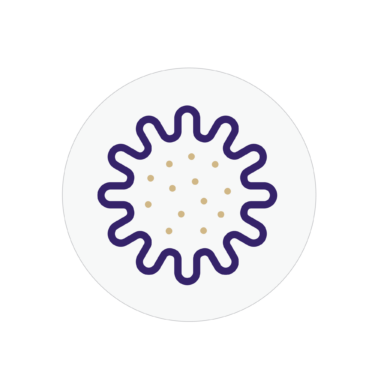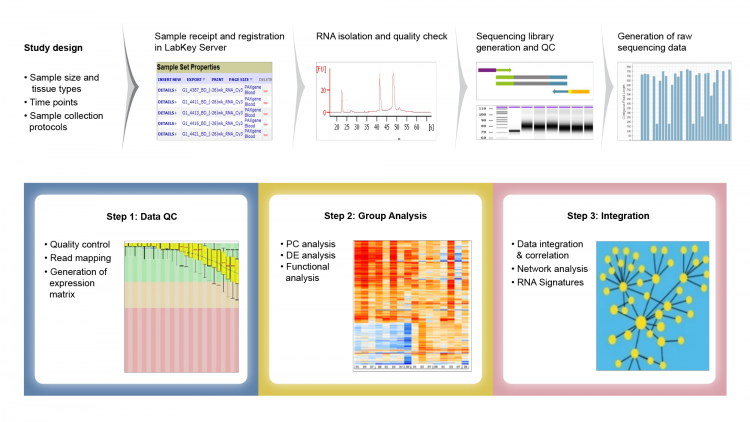 THE INFECTIOUS DISEASE & TRANSLATIONAL MEDICINE UNIT (IDTM) is comprised of five Core Faculty and 13 affiliate investigators that together provide a broad spectrum of research foci to advance and support research in nonhuman primate models of infectious diseases in the following areas:
THE INFECTIOUS DISEASE & TRANSLATIONAL MEDICINE UNIT (IDTM) is comprised of five Core Faculty and 13 affiliate investigators that together provide a broad spectrum of research foci to advance and support research in nonhuman primate models of infectious diseases in the following areas:
- AIDS-related Diseases
- Systems Biology
- Maternal and Fetal Health
- Emerging and Re-emerging Infectious Diseases
Core Scientists
| Name | WaNPRC Unit | Position | UW Department(s) |
|---|---|---|---|
| Deborah Fuller | Infectious Disease & Translational Medicine, Virology and Immunology Core | Associate Director for Research, Core Scientist | Department of Microbiology |
| Cynthia Derdeyn | Infectious Disease & Translational Medicine | Core Scientist | Department of Laboratory Medicine and Pathology |
| Kristina Adams Waldorf | Infectious Disease & Translational Medicine; Focus area: Reproductive and Fetal Health | Core Scientist | Department of Obstetrics & Gynecology |
| Michael Gale, Jr. | Infectious Disease & Translational Medicine; HTMPC, CDAC, Seattle Genomics | Chief - Core Scientist | Department of Immunology Department of Microbiology & Global Health CIIID CERID |
| Sean Murphy | Infectious Disease & Translational Medicine | Core Scientist | Departments of Lab Medicine Department of Microbiology CERID |
| Megan O’Connor | Infectious Disease & Translational Medicine | Core Scientist | Department of Microbiology |
Research Units
AIDS-related Diseases Unit (Director: Deborah Fuller, PhD)
This Unit supports researchers nationwide in basic studies to define the host-viral mechanisms contributing to AIDS-related diseases including HIV co-infections. Translational studies led by IDTM core scientists and affiliates also include the development of novel vaccines, HIV cure strategies and microbicides. New assays and tools developed through IDTM’s Virology & Immunology Core and its NHP modeling studies play a key role in these endeavors providing sensitive measures of the impact of therapies on viral reservoirs and host immune responses.
- Vaccine and antiviral testing
- HIV co-infections
- NHP models and pathogenesis
- Virology and innate immunity
- Humoral, mucosal and cellular immunology
Systems Biology Unit (Director: Michael Gale Jr., PhD)
This Unit is driving the field forward with its cutting-edge functional genomics technologies and computational modeling techniques developed by the HTMPC and CDAC that provide valuable resources for researchers nationwide in defining host responses contributing to infectious disease vaccine and therapeutic efficacy. In addition, the Unit conducts studies of infectious disease to define the molecular mechanisms of the host response to infection including pathogen sensing and innate immune response, immune programming, and mechanisms of disease. By applying functional genomics and computational modeling approaches, the Unit evaluates the molecular response to infection to define regulatory nodes of gene expression to target in therapeutic strategies to enhance immunity for suppression of infectious disease.

Maternal and Fetal Health Unit (Director: Kristina Adams Waldorf, MD)
This Unit is focused on the impact of pregnancy infections on the health of the mother and her fetus to prevent infection-associated birth defects, preterm birth, miscarriage and stillbirth. This Unit also investigates new therapies and vaccines to protect the fetus and mother. Infectious diseases studied include Zika virus, Group B Streptococcus, influenza viruses and SARS-CoV-2.
- Congenital Zika syndrome
- Perinatal Group B Streptococcus infections
- Maternal influenza viral infections
- Fetal injury due to infections
- Preterm birth
- Novel therapeutics for preterm birth and Zika virus infections
- NHP models and pathogenesis
- Immunology and virology
Emerging and Re-emerging Infectious Diseases Unit (Director: Sean Murphy, MD, PhD)
This Unit is focused on supporting efforts to rapidly respond to emerging and re-emerging infectious diseases. The development of new NHP infectious disease models and methods and assays to study them has played a key role in being responsive to new emerging infectious diseases including SARS-CoV-2, influenza, Zika virus, malaria and other mosquito-borne infections. These includes basic studies to define mechanisms of disease and translational studies to test new vaccines and therapeutics.
- Malaria
- SARS-CoV-2
- Influenza
- ZIKV
- Novel vaccine technologies
- Vaccine and antiviral testing
- NHP models and pathogenesis
- Immunology and virology
Research Cores and Fee-For-Service Support
The Unit also includes three Research Cores to develop essential capabilities and resources needed to support state of art infectious disease research in nonhuman primates. Resources developed in IDTM Cores are accessed by local and national investigators via collaboration with WaNPRC Core faculty or as a fee-for-service. The Cores’ skilled teams contribute to a robust research portfolio that aims to advance new research tools and methods to model infectious diseases in NHPs.
Virology & Immunology Core (VIC) link
The VIC develops cutting-edge virologic and immunologic assays, expertise and resources to support nonhuman primate research including AIDS, Influenza, malaria, ZIKV and newly emerging infectious diseases, like SARS-CoV-2. In addition, the V&IC supports a wide range of research programs by providing processing mucosal and other tissue specimens, analysis of immunopathology in tissues, analysis of viral loads (RT-PCR), immunologic monitoring of lymphocyte subset, CD4 counts, analysis of T cell responses by intracellular cytokine staining and multiparameter immunophenotyping to investigate changes in the innate and adaptive cellular landscape in NHP tissues during infection. The V&IC also supports the Center for AIDS Research (CFAR) Immunology Core.
High Throughput and Molecular Profiling Core (HTMPC) link
The HTMPC provides technology development including devising and conducting functional genomics/transcriptional profiling methods to study nonhuman primate models of infectious disease and systems biology. The HTMPC has established robust bulk RNAseq and scRNAseq pipelines supported by full instrumentation, and also provides specialty analyses of ChipSeq, ATACSeq, NanoString, and other applications for functional genomics to support nonhuman primate studies.
Computational and Data Analysis Core (CDAC) link
The CDAC uses a systems biology approach to perform data analysis using data sets from studies of NHP models linked to cell culture, tissue, rodent models, and human specimens within larger studies. The Core serves researchers to continuously evaluate/adapt the latest computational methods and software for up-to-date bioinformatics pipelines to integrate multiple projects, linked datasets, network analyses, time series analysis, and association of ‘omics signatures with phenotypic outcomes in nonhuman primate studies.
Seattle Genomics link
Transcriptional profiling (RNA-seq, Nanostring, and 16S microbiome) and bioinformatic and computational analyses developed by the HTMPC and CDAC are available on a fee-for-service basis through Unit-operated Seattle Genomics.
(VIC, HTMPC and CDAC), and Seattle Genomics (SG), the program income extension of HTMPC and CDAC that provide essential capabilities for NHP research at WaNPRC. The services of these Cores are also accessed by local and national investigators as a fee-for-service.
Training Program
IDTM offers a rich environment for training the next generation of scientists in basic and translational research. Each year, IDTM faculty mentor ~40-50 early-stage investigators, post-doctoral scholars, graduate students and undergraduate students. WaNPRC trainees have numerous opportunities to engage in career development workshops, attend and present at symposia including the NHP primate models for AIDS and WaNPRC’s annual symposium, and network with a wide range of investigators collaborating with IDTM including researchers in the Center for Innate Immunity and Immune Disease (CIIID), Center for Emerging and Re-emerging Infectious Diseases (CERID), Alliance for Pandemic Preparedness (APP), and the Center for AIDS Research (CFAR). IDTM mentees go on to outstanding careers in academia, industry/biotech and government and acceptance into top-notch graduate and medical schools
Affiliate Researchers
| Name | WaNPRC Unit | Position | UW Department(s) |
|---|---|---|---|
| Lakshmi Rajagopal | Infectious Disease & Translational Medicine; Reproductive and Fetal Health | IDTM Affiliate Researcher | Department of Global Health |
| Jacob D. Estes | Infectious Disease & Translational Medicine | IDTM Affiliate Researcher | |
| Andrew McGuire | Infectious Disease & Translational Medicine | IDTM Affiliate Researcher | |
| Carl Fredrik Barrenäs | Infectious Disease & Translational Medicine | IDTM Affiliate Researcher | |
| Dan H. Barouch | Infectious Disease & Translational Medicine | IDTM Affiliate Researcher | |
| David Watkins | Infectious Disease & Translational Medicine | IDTM Affiliate Researcher | |
| Jan Komorowski | Infectious Disease & Translational Medicine | IDTM Affiliate Researcher | |
| Jennifer Manuzak | Infectious Disease & Translational Medicine | IDTM Affiliate Researcher | |
| Louis Picker | Infectious Disease & Translational Medicine | IDTM Affiliate Researcher | |
| Kim Woodrow | Infectious Disease & Translational Medicine | IDTM Affiliate Researcher | Department of Bioengineering |
| Dorothy Patton | Infectious Disease & Translational Medicine; Reproductive and Fetal Health | IDTM Affiliate Researcher | Department of Obstetrics & Gynecology |
| Melanie Shears | Infectious Disease & Translational Medicine | IDTM Affiliate Researcher | Department of Laboratory Medicine and Pathology CERID |
| Rodney JY Ho | Infectious Disease & Translational Medicine | IDTM Affiliate Researcher | Department of Pharmaceutics |